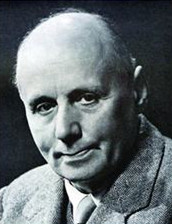"I'll teach her" | Youth Impact
Issue date:2021-11-11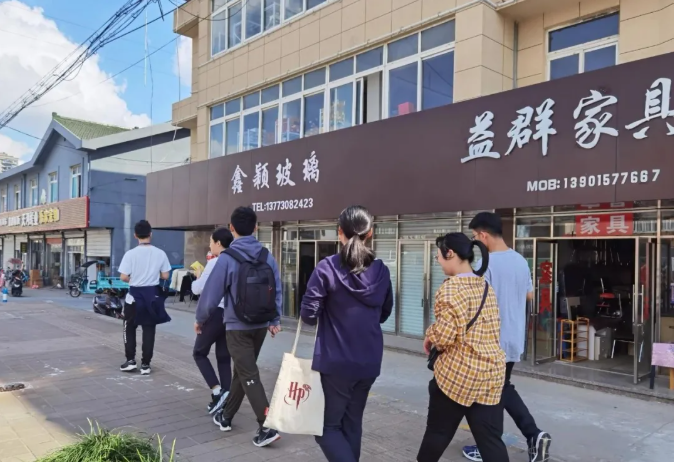
At UWC Changshu China, students are inspired to become dreamers who do. Students take initiatives to engage in the local community and make an impact through learning by doing.
"SeeSalt Inclusive Finance Initiative" is a non-profit organisation founded in 2019 by UWC Changshu China students. It aims to provide accessible one-to-one consulting service for some relatively poor individuals in Changshu in an effort to improve their lives. They have taken a remarkable step to solve real world issues by applying what they have learned.
Reaching up, the gaunt old man adjusted his glasses in a genial gesture. Behind the yellowing oval lens, one could easily picture him as he was twenty years ago, principal of his village’s only middle school.
Mingde* was one of our first clients at the SeeSalt Inclusive Finance Consulting initiative. After retirement, he and his wife Wu – a former high school teacher – found themselves in an old neighbourhood of Yanli, an apparel-manufacturing town near our Changshu school campus. As the new decade approached, they struggled to make ends meet on their pensions, which remained largely static despite gradually climbing prices.
Walking to Mingde’s with my friends and teammates, I recalled our first consulting sessions with the couple. How, week after week, we trudged back through the alley heavy with uncertainty. How could we even begin to solve a dilemma that many of the elderly across the country faced? The tenth-of-a-yuan haggling that I was puzzled by as a four-year-old, accompanying my grandmother to the grocery market, now made sense. Invariable, those first Saturday evenings all ended with us repeating the same dismal macroeconomic conversation.
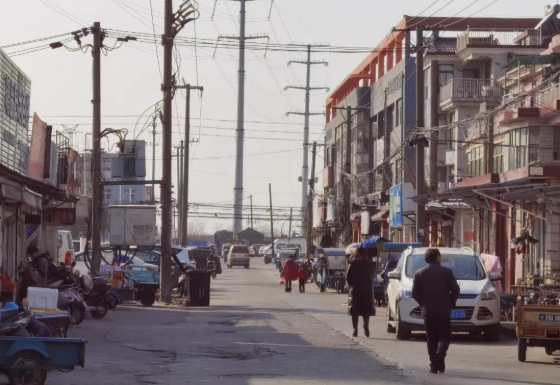
Yanli, an apparel-manufacturing town near our Changshu campus
One Saturday the déjà vu finally caught up with me. "We need to change our focus", I interjected "Talking about the big issues, the broader economic forces, won’t get us anywhere. We can’t uproot the forest, so it’s time to look at the trees. Focus on the specifics of this one case. Our solution may only work once, but that will make it better than all the universal theories we can’t apply."
Unfortunately, we were high schoolers trying to make a difference, not characters in a Hollywood movie about high schoolers trying to make a difference. But sometimes, those magical epiphany speeches do happen – and nothing changes.
Real breakthroughs pounce on you unexpectedly, like a bowl of cold soup.
I was visiting Mei. A jade shop proprietor and single mother, she was our only other client at the time. Negotiating with a buyer on the phone, she stole anxious glances at her fifth-grade son’s math homework while motioning for me to come in. Like me, the poor little fellow just had no knack for numbers. Stacked atop a display case for necklaces, teetering mountains of exercise books loomed taller than the chubby grade-schooler they were intended for. Between two stacks sat a tureen of long-abandoned spinach and tofu soup, forgotten amid myriad anxieties and hopes of life.
Was the soup Mei's lunch or dinner? Without the means to outsource her son’s education, would Mei ever be free of that perennial Chinese-parent worry? How could the former principal and his spouse improve their financial prospects? These questions lingered on my mind for a long time.
Then I realised that, in an apparel factory-town of busy parents who worked long, toilsome hours, those two questions answered each other.
The next Saturday, we came to Mingde and Wu with a plan: an after-school program for elementary students. His being a former principal was widely known among his neighbours. With most parents working extended hours and (as learned from chats with square-dancing grandmothers), generally concerned about their children’s grades, there was high demand for educational services. And for the former-teacher couple, supplying the demand would be a piece of cake.
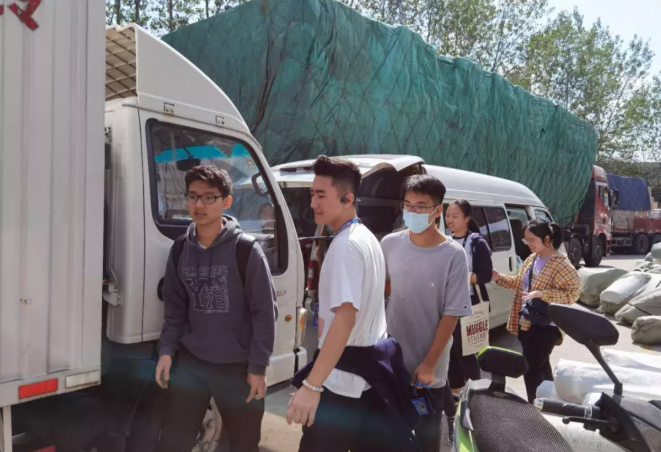
Sliding through alleyway shortcuts
That day was six months ago. The couple’s after-school service now counted thirty students. Now, for the first time in a while, Saturday found Walden, Arwen, Bryan and I on our way to the principal’s house once again. Sliding through alleyway shortcuts, we swiftly traversed the constellation of small apparel factory-workshops at the heart of Yanli. The cashier of the curb side deli greeted us with "Saturday again, huh?"
The town had become an old friend.
Through our work we developed deep connections with the members of the community with whom we worked, such as unemployed migrant workers, the community of single mums, and construction workers. We got to know them and connected with their life stories, and the other communities they belong to, and found ways to change their lives. The strength of the project lies in building emotional connections with members of the community.
As well as the human element, the project is also based on survey and macroeconomic data, using technical means to analyse the development patterns of the Changshu region and explore the potential for economic growth.
We never thought of ourselves as "helping" our clients. They are our partners in projects that would hopefully make a difference in their lives, friends with whom we talk and advise. And today, we were here to ask for Mingde’s help.
We sought advice on behalf of our youngest client, eight-year-old Li. Considering education’s status as an economic prime mover in China – capable of escalating property prices and raking in billions in exam-prep fees – we shouldn’t have been surprised that many of our cases circled back to it. Technically, the client was Li’s mother, a migrant worker from Manchuria. A cheerfully stoic woman of thirty-five, she spoke with the Northern tang that twenty years in Shanghai had faded out of my father’s voice. Yet, last week, the usually gregarious woman seemed particularly on edge. Not wanting to pry, I continued my Saturday visit as usual. Yet, as I was about to say goodbye, what came out instead was a half-whispered "is everything okay?"
"Li’s mid-term grades come out today." She lisped, thoroughly tired. "I couldn’t sleep yesterday. I know I’m greedy – I can’t give her as much as I want to, but still I expect so much from her – but I… I just hope she can have a better future. At this rate, I don't think she’ll even get into an average high school."
Li, a lanky eighth-grader with tousled ponytail, was one of the 31 million children in China whose parents work in more economically robust regions, leaving them with grandparents or relatives. Mei, the jade-shop proprietor, had graduated high school and went on to vocational college. This allowed her to at least make sense of the increasingly complicated elementary school coursework. (A cage contains 47 chickens and rabbits. There are 118 legs. How many chickens are there?, runs an algebra problem now taught to third-graders.) Li's mother, meanwhile, never received her middle-school diploma, and couldn’t help Li beyond teaching her to read and do basic maths.
None of us thought that Mingde, with thirty students already to manage, would simply agree to teach Li, a child he didn’t even know, remotely through WeChat. Teaching children one-on-one was hard work, if the self-deprecating humour of parents on Chinese social media was any indication. Somehow, those three simple words——"I'll teach her.",made our efforts seem less like a host of isolated cases and more like a network of real, embodied human connections.
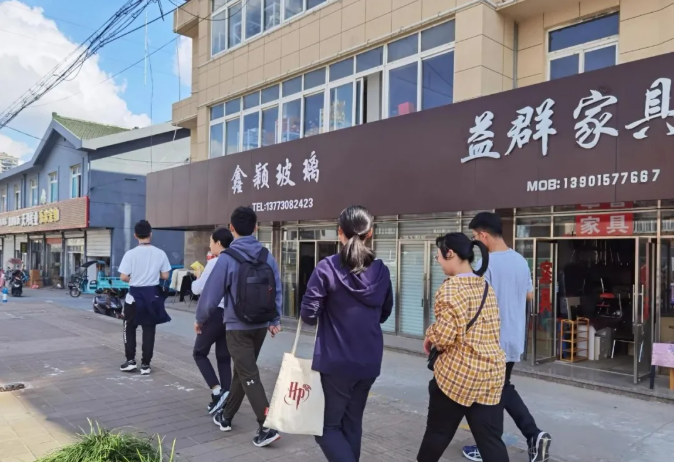
Traversing the constellation of small apparel factory-workshops at the heart of Yanli
We are told that the invention of money depersonalised economics. Unlike the world of ancient villagers relying on relationships with neighbours, modern economics, we are told, is the impersonal sphere of rational (wo)men. But money never supplanted that ancient economy. From handshakes in boardrooms to organisations dynamics at every level of the production chain, economics has always been primarily human. Once we recognise and reclaim humanity's infinite capacity for association, the complexity, the unpredictability, even the hazard of connection, can be channelled towards meaningful change.
Economics is not a science. It is the alchemy in which two needs fulfil each other, and two fears coalesce into hope. The connections we build are not a sidenote, but the nexus without which nothing can exist.







